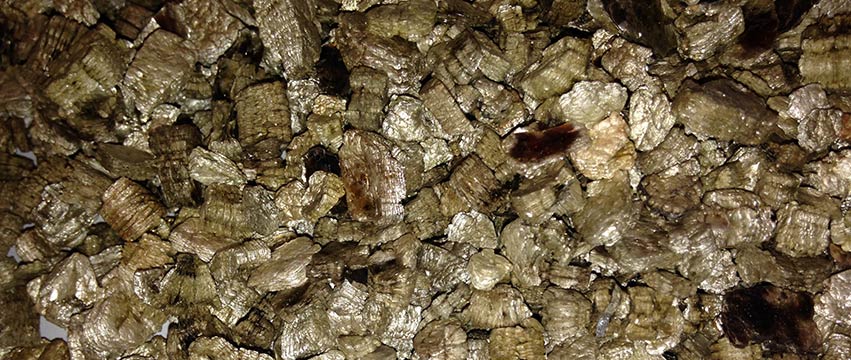VERMICULITE – GETTING ACQUAINTED WITH THIS VERSATILE MINERAL
WHAT EXACTLY IS VERMICULITE? The word “Vermiculite” literally stems from the Latin word “Vermiculus”, which when translated to English means “little worm”. When vermiculite is subjected to heat, it expands (which is called exfoliation) to firm elongated worm-like particles which are incombustible, lightweight, compressible, highly absorbent, recyclable and non-reactive. Unlike asbestos, Vermiculite is non-carcinogenic and 100% safe. The colour of un-exfoliated (raw) vermiculite is light to dark brown with a yellowish tint.
WHEN THE VERMICULITE IS EXFOLIATED, ITS COLOUR CHANGES TO GOLDEN BROWN WITH A BRONZE TINT.
Vermiculite is a hydrated magnesium aluminium silicate mineral, and it resembles the mineral mica in appearance. Vermiculite can be found in various countries across the world. These countries include Australia, Brazil, Bulgaria, Kenya, Russia, South Africa, Uganda, USA and Zimbabwe.
Here at Sun Silicates, we procure the raw vermiculite from the Palabora Mining Company which is situated in Palaborwa, Limpopo. Vermiculite is mined using open cast mining techniques where the vermiculite ore is separated from other minerals and then screened or classified into several basic particle sizes. Every care is taken in mining operations to minimize the impact on the environment and to restore land to its natural condition when mining ends.
Vermiculite is such a versatile mineral! The crystal structure and chemical characteristics makes this mineral ideal to be used in various markets and industries. Exfoliated vermiculite is used in construction, industrial, horticulture and agriculture. Vermiculite is always used in the horticultural sector in its exfoliated form and it has the benefits of improving soil aeration while retaining moisture and nutrients to feed roots, cuttings and seeds for faster, maximum growth. Vermiculite have been used for decades by professionals, dedicated amateurs and gardeners. Vermiculite typically holds up to 160 percent of its own weight in water, slowly releasing it to the plant roots while insulating the surface from the sun’s heat thereby extending the times between watering and creating optimum growing conditions.
The finer grades of exfoliated vermiculite can be used with cement and other aggregates to produce roof and floor concrete screeds or concretes which have the benefit of being both lightweight and insulating. Roof screeds containing vermiculite are often used in conjunction with other insulation materials such as polystyrene board to form a total roofing system. Vermiculite is becoming very popular to use in fireplaces because it can be made in a mould to fit almost any size, pattern or shape of the interior of a fireplace. Fire proofing improvements of these sprays replace asbestos containing fire proofing and girder insulation. It is still widely used in construction to protect the steel structures. During fires catastrophic failures can occur when the steel overheats and loses it strength by insulating it with the vermiculite and cement paste it insulates the steel thereby improving its fire rating( can withstand the fire for longer allowing the fire fighters to douse the flames before failure occurs.
Vermiculite has many other advantages, the first being that this mineral is quite inexpensive due to its low density you get a large quantity of material for your money. Vermiculite is also a sterile and odourless mineral. It also has a very high temperature resistance (thus making it ideal for insulating electrical cables in building structures) as it is a fire retardant. When filling wall cavities insulates and reduces your energy loss through the walls thereby saving energy costs and ensuring a comfortable living space.
Vermiculite is the ideal mineral to be used when gardening. This mineral increases the plants’ nutrition and water retention and it aerates the soil which in the plants grows. This results in more robust and healthier plants in your garden. Vermiculite also enhances drainage. The mineral holds the water until the plant’s soil starts drying out. When this happens, the vermiculite releases the water. Vermiculite can also be used as a soil conditioner for plants. Unlike vermiculite, compost eventually breaks down into the soil. Vermiculite, unlike compost, permanently improves the drainage of the plant. Another benefit of using vermiculite in your garden, is that is makes other minerals and nutrients available for the plant to absorb. The vermiculite naturally reacts with the soil compounds, making calcium, magnesium and potassium available for the plant. Last but not least, when doing flower arrangements, one also uses vermiculite. One must just double check that you are using horticultural vermiculite and not vermiculite that is used for insulation, as this is treated to repel water. When using vermiculite in flower arrangements, it eliminates the need to change the water on a regular basis, it keeps the flowers fresh and it doesn’t spill. All you do is fill the container with vermiculite, fill it with water and pour out the excess water.
Every person should have a bag of vermiculite in their homes especially in hot and dry climates it will save you time, water and money. With so many applications and advantages – why are you still without it?
For further information regarding any aspect of vermiculite, please contact Sun Silicates (Pty) Ltd.



No Comments